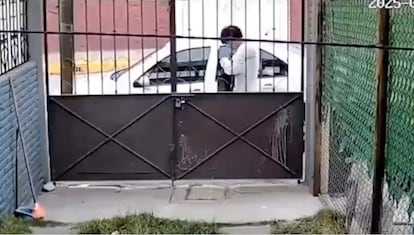The child's son

Text in which the author advocates ideas and draws conclusions based on his or her interpretation of facts and data.

This is an installment of Mexico's weekly newsletter, which can be followed for free at this link
On February 11 , a shocking piece of news spread through social media in the form of a video: a boy was seen furtively getting rid of a bag containing a live newborn. The boy, 18, and his mother, 21, are in preventive detention and could be sentenced to 40 years in prison. The event has brought to light so many facets that the debate is branching out into the sad reality that grips thousands of young Mexicans. Sordid worlds that condemn them to misery and crime. The prisons in this country are full of lives that have not yet begun.
The State Attorney General's Office of Mexico has shared the photo of the young men with their eyes covered. He has teenage skin, glasses and curly black hair, a boy. She has a similar appearance and reddish letters tattooed on her neck. A girl like millions, a daughter like any of you, readers. While they wait for them to be judged, thousands of trials have already passed over their heads, photographed for the criminal records.
From the conversation they had on their cell phones, we know that both decided to get rid of that formed, moving fetus: “I’m so scared. My God. I can’t. This is so bad. Throw it in some channel, I don’t know,” says the mother. “Don’t look at it anymore, love, don’t pay attention to it. I’ll throw it away as soon as I go home. And you won’t see it again,” he answers. “I feel very bad, Luc,” she adds. “We feel bad.” […] “I know this is wrong, but there was no other way,” concludes the boy. In search of lessening the sentences, the defense says that economic desperation consumed the father, who freely gave his testimony and waited at the scene for someone to pick up the bag of crime.
The latest record, from 2023, records the birth in Mexico of 100,000 babies to underage mothers . Thousands more are born when the parents are not yet 24, without studies, without work. Legions of grandmothers make sure that the family gets by, but the effort is not enough and history repeats itself: those born will be parents before they stop being children and some grandmothers will replace others. The social elevator is useless. It remains stuck on the first floor of misery. Some of those who these days put their hands to their heads in the face of such a monstrosity have never set foot in these neighborhoods of Mexico that take you back to Dickensian centuries. Poor houses built like a Lego set, but without colors, a forest of gray blocks where the city pours its humors. There are crowded families ranging from the newborn to the great-grandmother who cooks for dozens of relatives who come and go to deposit the few pesos left by the workday. No one has seen any other life there and it is the one they repeat screwed to the wheel of fortune. Damned fortune.
The State owes a debt for decades of neglecting these stinking streets where garbage is processed, water arrives whenever it pleases, sometimes in floods of mud, and electricity is stolen from a tangle of cables. Or it charges, which is worse. Dozens of street markets sell everything at a low price and of poor quality so that the merchant can eat that day and the newborn has pajamas. The curious thing, someone from the first world would say, is that in these families pregnancies are received with joy. It is the joy of the manger, damn it, of Mary and Joseph, the donkey and the ox, of those who give as many children as they can to a God who is never pleased. In these bedrooms separated by curtains made of scraps, children hear the nights of their elders. Before they grow up they will be parents and will inherit the gray Lego to their children.
What is the world in which these boys grew up, who on February 11th lost their lives between blood and placenta? Who knows. But nobody dares to judge before the governments bring justice to these neighborhoods.
EL PAÍS






